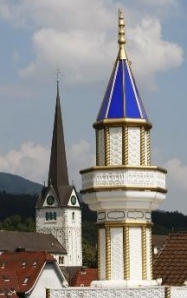According to Amnesty International, the referendum decision also breaches the prohibition of discrimination on the grounds of religious belief as set out in several international human rights instruments that Switzerland is a party to.
“The yes vote comes as a surprise and a great disappointment. That Switzerland, a country with a long tradition of religious tolerance and the provision of refuge to the persecuted, should have accepted such a grotesquely discriminatory proposal is shocking indeed,” said David Diaz-Jogeix, Europe and Central Asia Deputy Programme Director at Amnesty International.
“The general prohibition of the construction of minarets violates the right of Muslims in Switzerland to manifest their religion. It can do lasting damage to their integration.”
I slam is the second largest religion in Switzerland after Christianity, and its followers represent over 4 per cent of the country’s population.
slam is the second largest religion in Switzerland after Christianity, and its followers represent over 4 per cent of the country’s population.
The ban is expected to be rejected by either the Federal Supreme Court of Switzerland or the European Court of Human Rights.
The proposal, which was initiated by members of two Swiss parties, asked Swiss voters if they wish to add the sentence “The construction of minarets is forbidden” to Article 72 of the Constitution.
“Contrary to the claims of the initiators of the referendum, a general prohibition of the construction of minarets would violate the right of Muslims in Switzerland to manifest their religion,” said Nicola Duckworth, Europe and Central Asia Programme Director at Amnesty International.
“A ban on the construction of minarets while, for example, allowing those of church spires would constitute discrimination on the basis of religion.”
The initiators of the referendum claimed that the construction of minarets was not protected by the freedom of religion as they have  “no religious significance”. They assert that minarets are “symbols of a religious-political claim to power and dominance which threatens – in the name of alleged freedom of religion – the constitutional rights of others.”
“no religious significance”. They assert that minarets are “symbols of a religious-political claim to power and dominance which threatens – in the name of alleged freedom of religion – the constitutional rights of others.”
Islam is the second largest religion in Switzerland after Christianity, and Muslims make up over four per cent of the country’s population.
There are hundreds of places of worship (mostly in commercial buildings or private residences) in the country but only four minarets have been built.
The Swiss government and all the other major political parties are recommending a “no” vote.
Local Christian, Jewish and Muslim leaders have also joined forces to reject a ban on minarets.
They say that the referendum also poses a threat to peaceful relations between religions and inhibits the integration efforts of Muslims in Switzerland.


